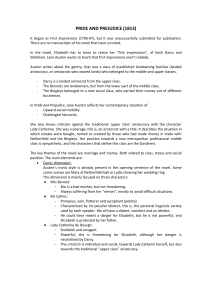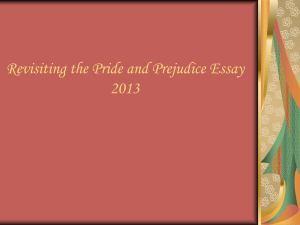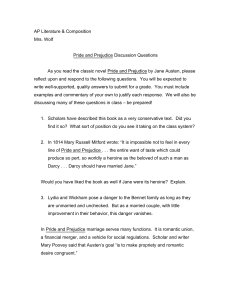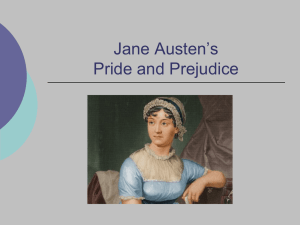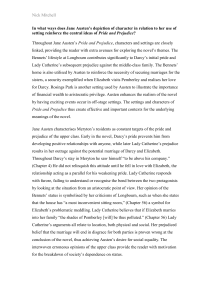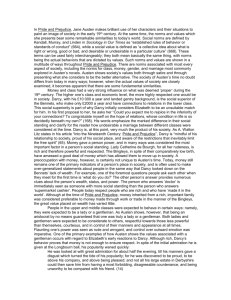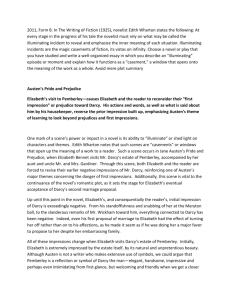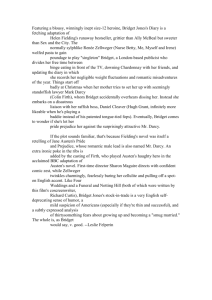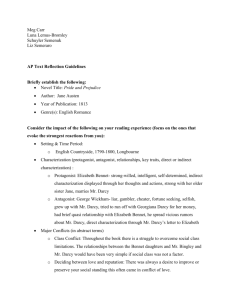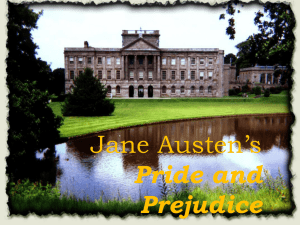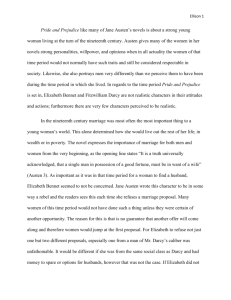Essay Prompt breakdown and tips
advertisement
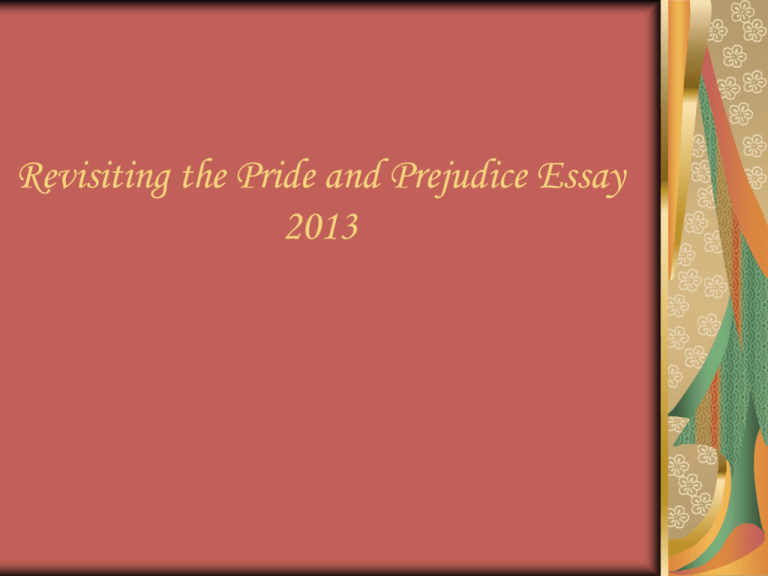
Revisiting the Pride and Prejudice Essay 2013 The Prompt period 3: Novels and plays often include scenes of weddings, funerals, parties, and other social occasions. (Subtext: look at the SOCIAL OCCASIONS). Such scenes reveal the values of the characters and the society in which they live. (subtext: your scene should reveal these things too) Select a novel that includes such a scene and, in a focused essay (!), discuss the contribution the scene makes to the meaning of the work as a whole. (subtext: author’s intent/theme/ overall function/message) Initial thoughts and mistakes p. 3 You didn’t pick a social occasion; you picked a private moment of reflection OR you picked too many moments, and that forced you to treat each one superficially because of the constraints of time, rather than taking the time to fully develop the implications of one. You confused characterization for meaning. Meaning means themes and ideas, not character arc/transformation The Prompt period 6 In The Writing of Fiction (1925), novelist Edith Wharton states the following,: “At every stage in the progress of his tale the novelist must rely on what may be called the illuminating incident to reveal and emphasize the inner meaning of each situation. Illuminating incidents are the magic casements of fiction, its vistas on infinity.” Choose a novel that you have studied and write a wellorganized essay in which you describe an “illuminating” episode or moment and explain how it functions as a “casement,” a window that opens onto the meaning of the work as a whole. Avoid mere plot summary. Common Error: You confused characterization for meaning. Meaning means themes and ideas, not character arc/transformation Initial thoughts and mistakes all Themes are STATEMENTS, not words or phrases. There is not a “theme of marriage” or “theme of class divisions.” What about this phrase? Example of a proper thematic statement: “Through the events at the initial dance at Meryton, Austen conveys that, in matters of social hierarchy, status is not proportional to breeding.” Period 6 prompt issues What does “illuminating incident” mean?? Sounds like somebody has to learn or realize something. So you’d better choose your incident wisely, and I’d bullet-point a list of things learned. 2nd part of prompt: HOW does this reveal/lead to meaning of the work? Vistas must be opened and this is where people spent lots of time discussing only character transformation and growth instead of how the moment leads to a message. Period 6 prompt issues in development You had to tell me exactly what specific behaviors Elizabeth was forced to confront in herself and her family when she read that letter from Darcy, not just that she realized “her first impressions about Darcy needed to be re-examined” or that “she let her pride overcome her better judgement” HOW? You also had to include specific text support to reference and SUPPORT the realizations she was making. For example, here’s how you weave text support and specific ideas: Lizzie’s enlightening and pivotal moment when reading Darcy’s candid letter serves to criticize both characters’ stubborn hearts of preconceived notions and careless pride and prejudice. (good with the specifics here; nice TS) Before the proposal and letter E and D had a cold relationship of misunderstanding, resulting from his snubbing her at the Meryton Dance and her misinterpretation of Darcy’s role in allegedly ruining Wickham’s inheritance. Darcy’s gradual feeling of love compelled him to approach Elizabeth with affection such as during the Netherfield Ball where he bravely asked her to dance with him or during those evenings at Rosings where he hovered over her at the pianoforte. However, Elizabeth had misinterpreted Darcy’s true intentions (as what??) and never considered that he would have any other feelings besides indifference or hate. (Yes, but what gives her that idea?) However, the letter provides a window through which Elizabeth is able to understand Darcy’s perspective and point of view (which is?) After Darcy sincerely apologizes about Bingley and Jane as well as thoroughly explains the incidence with Wickham (bravo!) Elizabeth immediately breaks down into self-critical awareness. An understanding of Darcy’s point of view helped her realize that she had been wrong to judge Darcy based on her own ill-willed prejudice. In addition (Wait a minute! Before you jump to another idea, go back to the specific behaviors E and her family had and what she is forced to confront other than the fact that she was wrong.) Common Mistakes Parroting back to me class phrases w/o showing any new ideas or insights (like, Austen shows that first impressions need to be re-examined or Darcy and Lizzie are blinded by their first impressions Saying the same message over and over w/slightly different phraseology (see above) Not having enough “apt and specific and consistent text support,” even w/o book, you should be able to recall enough moments. Common Mistakes Being way too general/generic when getting to how it contributes to meaning, ie. Overgeneralizing: - Austen shows her hated of the institution of marriage (really? All marriages, the end?) - Austen shows her criticism of social class (what about it?) - Austen shows a satire of society and class hierarchy (yes, she does, but what exactly in society is she satirizing? Which behaviors?) Note: the above examples are fine in an intro ¶, but not in the body ¶’s b/c they are too general Intro Paragraph Samples p. 3 Elizabeth’s first encounter with Lady Catherine at Rosings reveals their tense, forced conversation in which Lady Catherine’s condescension and disapproval required pithy and defensive statements from Elizabeth. (a social call/visit identified) This unexpected social call (characterizes the visit) indicates the vanity that LC’s fortune has created, as well as Elizabeth’s defensive and resolute nature. (uh-oh, is this going to be about character?) The interaction between Elizabeth and LC reveals Austen’s message that there are many limitations and expectations that are imposed simply because of one’s social standing, but that good breeding is no excuse for poor behavior. Intro Paragraph Samples continued Man is a social animal who reveals his true personality when put in social situations. Austen uses the social animal portion of human nature in P and P to criticize the idea that the divide between the rich and the middle classes will ultimately culminate in pride and prejudice on both of their parts. But as Austen tells of the behaviors of the Bennet girls and Mr. Collins at the Meryton and Netherfield dances, she suggests that not all rich people are prideful and not all poor people are prejudiced—one must look beyond the outer shell to truly understand character. (see the specific message?) Intro Paragraph Samples this year… In essence, women of Austen’s era had very little leeway with respect to the basic freedoms they were delegated. Contrary to being a fallacy of either/or, there were only two types of women in this era. Those who got married, whether it was to the dregs of society or its riches, and those who did not marry; the latter being the epitome of shame, independence, and self-esteem. In P and P, society is being satirized on its over-emphasis of class structure as well as its institution of marriage as a business transaction thus resulting in money becoming the “social currency” by which some characters’ actions become dictated. Through the not-so-elegant proposals of Darcy and Mr. Collins, one can see the value of communication and humility that is the essential “bread and water” of this time. Those who are without it “starve” in finding a suitable companion that Austen emphasizes is possible, but not very probable with her society’s current fixation of stability. Solid Topic Sentences that have ideas, not plot The first proposal Darcy attempted on Elizabeth helps to emphasize the social awkwardness between classes. With the introduction of the upper class—the Bingleys, the Hursts, and Darcy—during the Meryton dance, Austen illustrates how money creates a social divide between the rich and poor. The Ball demonstrates the extreme approaches to the social codes that are both explicit and implicit in this society. Making a decent TS even more effective Before: In her portrayal of the Netherfield Ball, and throughout the book Austen demonstrates the importance of having the right amount and kind of pride. One must care about one’s reputation so that behavior in public is amiable and honorable, and so that one has confidence where it is due. At the same time, though, one must humble themselves to see their own flaws and be able to improve upon them. After: As characters of varying social classes commit faux pas ranging from subtle digs to serious breaches of decorum at the Netherfield Ball, Austen demonstrates the importance of having and displaying the proper amount of pride. One must be socially aware about one’s reputation so that public behavior is amiable, honorable, and confident without seeming haughty. At the same time however, characters must act with enough humility to recognize their own flaws and ultimately improve upon them.
